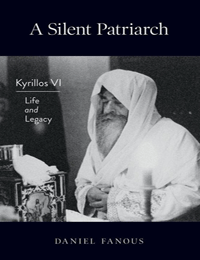
A Silent Patriarch
A Silent Patriarch: Kyrillos VI (1902–1971) is the first scholarly biography of the desert hermit who became a most unlikely patriarch. Until now the details of his life have remained hidden. As patriarch, Kyrillos inherited a bleeding church, one confronted by political Islamism, an indifferent Muslim president, and the rise of the Muslim Brotherhood. Silent in the face of persecution, mockery, and criticism, Kyrillos stood at the head of a nearly impossible spiritual revolution. But by the time he reposed, everything had changed.
In this lucid biography, Daniel Fanous traces Kyrillos’ life from childhood, drawing upon hundreds of letters and sources never before seen, detailing Kyrillos’ unusual method of ecclesial reform, which speaks enduringly to the uncertainties of the present age. This is the story of Kyrillos VI, a most unlikely patriarch, a silent urban recluse.
ABOUT THE AUTHOR
Rev. Dr Daniel Fanous is dean and lecturer in Theology & Biblical Studies at St Cyril’s Coptic Orthodox Theological College in Sydney, Australia. He is the author of The Person of the Christ and Taught by God: Making Sense of the Difficult Sayings of Jesus (coming soon to SVS Press).
ENDORSEMENTS
“Kyrillos VI . . . is a figure of great spiritual stature who was immersed in the depths of monastic life and in a life of unceasing prayer. . . . I commend Rev. Dr Daniel Fanous for this important study, which I consider a scholarly and outstanding addition to the history of our Coptic Orthodox Church."
—POPE TAWADROS II
“. . . an authoritative biography of Patriarch Kyrillos VI: a monk formed by the ascetic wisdom of the past . . . who came to occupy a position at the center of extraordinary movements of renewal and spiritual enlivenment . . . indispensable for understanding modern Coptic Orthodox church history . . . a portrait [with] significance beyond any single religious community.”
—MARK N. SWANSON
Lutheran School of Theology at Chicago
“. . . a timely gift to church leaders across the world as they ponder the question of ecclesial revival . . . his counter-cultural leadership . . . eventually helped incite reforms within [the Coptic] Church . . . showing how personal asceticism created fertile grounds for ecclesial revival.”
—NELLY VAN DOORN-HARDER
Wake Forest University

 NEED HELP? MAIL US:
NEED HELP? MAIL US: 





